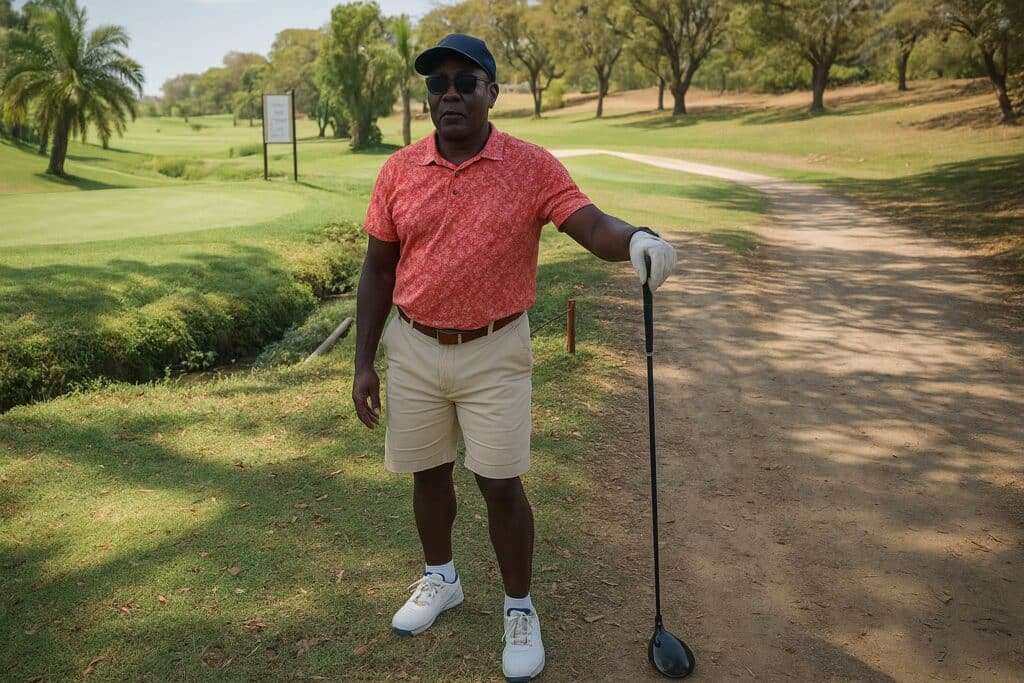Lubumbashi fairways crown a Brazzaville champion
The heavy afternoon air that draped the greens of Luano Golf Club could not muffle the final roar: a delicate chip from Roxy-Désiré Pango Mashimango stopped five centimetres from the eighteenth hole, sealing a cumulative 107 stableford points and the first Congolese victory in the third series of the 46th Lubumbashi Open. The Republic of the Congo’s anthem rose over Katanga’s copper hills, offering a symbolic echo of cross-Congo amity and of a sporting discipline long eclipsed by football. “I dedicate this title to my club and to an entire nation,” the 28-year-old declared, his voice steady yet unmistakably moved, as a tricolour flag unfurled behind the podium.
A performance that transcends the scorecard
Beyond the five-point gap that separated him from his closest rival, observers noted the maturity of Pango Mashimango’s course management—conservative off the tee, aggressive into the greens—hallmarks of coaching methods refined at the Golf Club de Brazzaville over the last decade. The result reverberated among the 165 participants from Central Africa, many of whom conceded that the Congolese technical benchmark has risen sharply. Julien Poisson, representing the coastal Golf Club de Diosso, completed the top five on ninety points, further confirming the depth of talent now anchored on the right bank of the Congo River.
Brazzaville Open: an impending home showcase
While the silverware still glistened in Lubumbashi, Grégoire Piller, president of the Golf Club de Brazzaville, was already looking ahead. From 28 to 30 November, the capital will host the first Brazzaville Open, an event he describes as both sporting milestone and civic ritual. “The Congo deserves to be a golfing nation. This tournament will be a founding act, a moment of shared pride,” he told reporters gathered under the club’s colonnades. Preparatory works include a re-contouring of the signature par-five ninth, installation of LED distance markers and a spectator village designed to accommodate schools invited to discover the sport.
Corporate backing fuels ambition and soft power
The recent momentum owes much to private partners led by Ecobank Congo, whose head of retail banking Tony Ndossa views the fairways as vectors of image and cohesion. He underlines that golf’s codes—etiquette, patience, merit—mirror the values the bank seeks to promote. Additional sponsorship discussions involve an agro-industrial consortium interested in highlighting sustainable land management through course maintenance. Economists note that such alliances, modest in absolute value, confer intangible benefits by positioning the Republic of the Congo as a venue for high-profile yet low-risk regional gatherings—an asset in a post-pandemic tourism strategy.
À retenir : un patrimoine sportif en gestation
The Lubumbashi triumph, the forthcoming Brazzaville Open and the planned inauguration of the Congolese Golf Federation on 27 November draw a coherent storyline. Taken together, they articulate a national project that blends athletic performance with institution-building. Sport historians recall that the country’s first documented golf match dates back to 1934 on a sand-and-oil course near Pointe-Noire; four generations later, the discipline is poised to acquire legal personality, codes of governance and pathways for youth development.
Le point juridique et économique
The statute of the future federation has already circulated among jurists. It aligns with the 2011 Sports Charter, prescribing parity in its executive bureau and a compliance office mandated to prevent conflicts of interest, thereby anticipating requirements of global bodies such as the International Golf Federation. From an economic standpoint, feasibility studies commissioned by the Ministry of Sports estimate that a domestic tour of four tournaments could generate 250 direct jobs and USD 1.2 million in local procurement annually—figures modest compared with hydrocarbons but significant for leisure diversification.
Towards an inclusive fairway culture
A central challenge remains accessibility. Annual membership fees at premier clubs still exceed the median urban wage. In response, the Brazzaville Open organisers have reserved a junior clinic, free of charge, supervised by Pango Mashimango himself. The gesture is not only philanthropic; it answers a strategic need to broaden the player base to sustain competitiveness. Early indications suggest thirty-eight pupils from Talangaï and Mfilou districts will attend, signalling a possible sociological shift for a sport often perceived as elite.
A measured optimism for Congo’s golfing future
Neither officials nor sponsors underestimate the road ahead: course infrastructure is concentrated in two cities; equipment import duties remain high; and Central Africa’s tropical climate demands costly agronomy. Yet the synergy observed since Lubumbashi fosters a sense of realistic optimism. As the sun sets over the Congo River, one can already imagine the ceremonial first drive of the Brazzaville Open punctuating a season that many now call year zero of modern Congolese golf.

